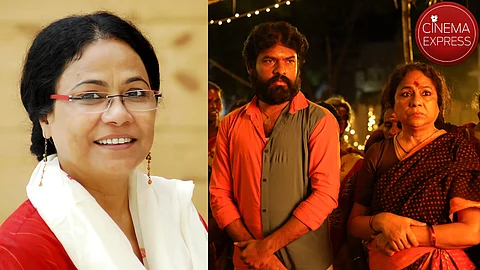

From the stark realism of Bandit Queen to the nuanced silence of Khamoshi: The Musical, Seema Biswas's career spans a wide range of films. After appearing in films like Iyarkai (2003) and Thalaimagan (2006), she is returning to Tamil cinema with Om Kali Jai Kali. The web series stars Vemal in the lead and promises to explore mythology and politics. In an exclusive conversation with CE, Seema offers a glimpse into her series, which is releasing on March 28 on JioHotstar. She also speaks about her insights into acting, the industry's evolution, casteism in Indian cinema, and the complex characters that have defined her journey.
You have played many powerful roles. What draws you to them?
I do not seek such characters specifically. As a theatre actor, I want to play various roles. Sometimes, I get to play an ordinary person from a humble background, whereas other times, I feel like portraying a strong woman, the so-called sophisticated role, which is against my personality. However, I prioritise the quality of the story.
What in Om Kali Jai Kali appealed to you the most?
The subject is interesting, rooted in mythology and featuring a ritualistic element. My character is like an informer for the main antagonist and has a mixture of positive and negative shades, which I found interesting to explore. Director Ramu (Chellappa) is dedicated, hard-working and passionate. He came down to Mumbai and narrated the story to me with a translator. On set, I was very nervous about the language but Ramu would often say, ‘That is my headache, you leave that to me.’ He used dialogue prompts to help me.
What difference do you find between old and new filmmakers?
The main difference I see is that today, filmmaking happens quite faster. In the past, films rarely started and finished on time and depended on stars’ availability. When they had date issues, shooting would stop and resume a few months later, which I did not like. Also, with digital cameras today, directors would take many shots, which simplifies the acting process.
What are the differences between acting in theatre, films, and web series?
Theatre is an out-and-out actor’s medium. Directors would be around only until the rehearsal stage. However, films are a director’s medium because they get to decide whether or not to have retakes. Web series is a combination of director and writer’s medium. I like the instant reaction from a live audience a lot more. Sometimes, the audience is happy with your performance; other times, they are disappointed. There are also times when you do not even know what they feel (laughs).
How do you calibrate your performance when the audience does not like it?
I change the intensity, timing and rhythm of my performance according to the live audience’s energy. Performing on stage or in front of the camera is like death: entirely spontaneous. Every actor strives to do their best; unlike those who take the nine-to-five grind, their personality itself is their job.
Many actors find it hard to come out of their characters. Have you experienced this?
No, I have been fortunate to work in theatre and films as a leading actor and in the National School of Drama’s festival plays. That said, I have found it exhausting to go through the process of homework before shooting where I internalise a character. This process takes time, but with experience, I have found it easier to switch on and off between takes.
Why does age often define an actor's role in India?
The sad part of Indian cinema is that you get typecast. I still remember when I just finished Bandit Queen, Sanjay Leela Bhansali saw its rough cut and wanted to cast me in his directorial debut Khamoshi: The Musical (1996). I was offered to play Manisha Koirala’s mother in the film; Shekhar Kapur and many other directors told me not to do it, lest I get typecast. Before Bandit Queen’s release, the controversy regarding my character’s appearance and language made me believe that it would be my last film. I wanted to prove to the world that I can act. Therefore, I took up the challenge of playing a deaf and mute character in Khamoshi: The Musical. I always listened to my heart as I did not have any godfather in the industry.
You are also returning to Bengali cinema after a long gap with a film directed by Shiboprosad Mukherjee…
Yes, I am reuniting with Shiboprosad after Lajja, a film that got shelved. I acted with Shiboprosad in Bengali in 1995, but he has now become a very big director in Bengali cinema. Recently, he called me and told me, ‘There is an excellent role for you.’ However, it is not my comeback to Bengali cinema; I also did a film titled Man Patang recently.
You also worked on Jolly LLB 3. Is it a comic role?
Akshay Kumar and Arshad Warsi are part of it, which means plenty of comedy. However, my character appears in the more serious portions of Jolly LLB.
Lately, there has been much discourse about the relevance of anti-caste cinema in Tamil. How modern is your series in that regard?
I do not believe in caste. However, there is plenty of casteism in society, and cinema is the strongest medium to communicate with society. Films can have a stronger effect on people than politicians, so they should never misguide them.